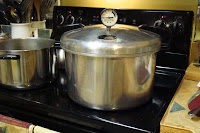
Canning from 2pm until ... well I'm still going so I'll have to get back to you on that. Carrots, beans and beets harvested, cleaned, peeled (just the carrots and beets), chopped, packed in jars and processed. Thank god my mom was here to help or I would have passed out in a pile of sweat in the middle of the kitchen. And how come canning day always falls on the hottest day of the summer?
But we are now ready to be snowed in with the power out - bring it on, we got enough food to eat like kings for a couple weeks.
If you haven't processed food in a pressure cooker before but are pretty well versed in pickling and jamming, it is time to expand you repertoire. Pressure cooking is a great way to process lots and lots of fresh veggies. I have a huge pressure cooker and by October I will have processed enough food to last until next summer. Here are some tips if you decide to make the leap:

1. Always follow the manufacturer's instruction, word for word. Never ever look for ways to speed up the process. You'll end up ruining your equipment, injured or with contaminated food.
2. Always have lots of boiling water at the ready. Boil 16 cups of water in a big pot. Use a ladle to put boiling water over your veggies and then use a large measuring cup to put boiling water into the pressure cooker. While the cookers is doing its thing, add more water to the pot and bring to boil.
3. Run the rubber gasket under hot water to make it expand slightly before inserting it in the pressure cooker's lid and securing the lid to the cooker.
4. When the cooker is within 3 pounds of the desired pressure, turn the heat down to medium-low. If you wait until you hit the desired pressure before turning down the heat, the pressure will go over.
5. Leave one of our stove's burners open and off. When the times up, move the cooker to the open burner to cool. It will cool down faster than leaving it on the turned off, but still warm, burner.
6. When you are all done and ready to pack up, rub a little olive oil over the rubber gasket. This will keep the gasket from getting brittle. My gasket is nearly as old as I am - really, it is.













1 comment:
Very good tips! Keep them coming, we are looking forward to learning how to can when we get this new garden going.
Post a Comment